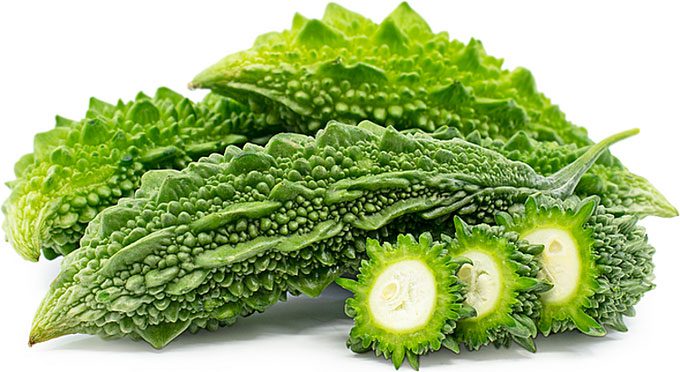Bitter melon, wormwood, and asparagus are three types of vegetables known for their bitter taste, significant health benefits, and versatility in cooking.
Bitter Melon
Bitter melon, also known as bitter gourd or Momordica charantia, features a long, oblong shape with many protrusions. The immature fruit is light green, while the ripe fruit turns a rosy yellow and contains flat seeds surrounded by a red membrane. In our country, bitter melon is cultivated widely and can be cooked with shrimp, lean pork, stewed with bones, steamed with minced meat, pickled, made into salads, stir-fried, braised, or eaten raw…

Bitter melon has numerous blood-enhancing, heat-clearing, and aphrodisiac benefits… (Image: Specialty Produce).
According to Dr. Bui Dac Sang from the Institute of Science and Technology, bitter melon contains a bitter glycoside known as momordicin, along with vitamins B1, C, and amino acids like adenine and betaine. The seeds contain oil and bitter compounds.
In Traditional Chinese Medicine, bitter melon is characterized as bitter in flavor and cool in nature. This fruit is known for its heat-clearing, blood-cooling, eye-brightening, and bowel-regulating properties, making it ideal for summer. Additionally, the seeds are bitter and sweet, enhancing vitality and sexual health. The flowers are cool in nature and help prevent stomach ulcers. The leaves also assist in heat-clearing and detoxification.
“Eating bitter melon raw or brewing it as a tea provides the best heat-clearing and detoxifying effects,” the herbalist stated. Furthermore, dried leaves can be powdered and consumed in 12-gram doses with alcohol, or fresh leaves can be crushed and heated as a poultice for painful boils.
Wormwood

Wormwood, also known as Artemisia absinthium or mugwort, is a nutritious vegetable harvested year-round. In the fifth lunar month, the whole plant is harvested, dried, and used as medicine. Dried leaves crushed into small pieces are referred to as dried wormwood, used as a seasoning.
Wormwood has a bitter, slightly spicy flavor, a strong aroma, and is warm in nature. It has antiseptic properties, supports pregnancy, and alleviates abdominal pain caused by roundworms.
Some nutritious dishes made with wormwood include steamed eggs, chicken, bird, and beef with wormwood, omelets, and hot pot. Wormwood can also be brewed with fresh ginger, cinnamon, or dried ginger to treat abdominal pain, and it helps relieve symptoms of sweating, fever, chills, and headaches…
Herbalist Sang cautions that wormwood contains anfa thuyon, which may be stimulating, so it should not be consumed in excess.
Asparagus
Asparagus is rich in nutrients and fiber, aiding in weight loss, enhancing skin health, and supporting digestion, and can be prepared in various ways.
Nutritionist and dietary expert Bhavisha Khuman states that asparagus belongs to the lily family and features edible tender shoots. Asparagus is commonly boiled, steamed, grilled, or sautéed, and has a light fragrance and slightly nutty taste. It is considered one of the healthiest vegetables.

Asparagus is a delicious and premium vegetable, but its usage is not as widespread as other vegetables due to its higher cost, resulting from relatively complex cultivation techniques. In our country, asparagus is imported for cultivation, but the planting area remains quite limited.
In every 100 grams of asparagus, there is 93.7 grams of water, with the remainder consisting of minerals such as calcium and phosphorus, but it lacks vitamins. Asparagus contains a significant amount of the nitrogen compound asparagine, beneficial for building, dividing, and repairing body cells.
Enhancing skin health: Asparagus is a source of antioxidants that combat free radicals in the body, reducing the risk of chronic diseases and improving skin health.
Supporting digestive health: Experts inform Health Shots that the fiber in asparagus can support regular bowel movements, promoting a healthy digestive tract.
Diuretic properties: Asparagus has a mild diuretic effect, helping to eliminate excess salt and water from the body, thus lowering blood pressure.
Acts as an aphrodisiac: Asparagus is often considered to have aphrodisiac properties, although its effects on sexual health have not been scientifically validated. Khuman explains that the notion that asparagus can enhance sexual performance or desire may stem from its high nutrient content, which contributes to overall health and vitality.
Supporting weight loss: Asparagus is rich in fiber, aids digestion, and helps regulate blood sugar levels. The fiber also makes you feel fuller, which is beneficial for weight management. Asparagus is relatively low in calories yet provides essential nutrients, making it an excellent choice for those looking to maintain or lose weight.


















































